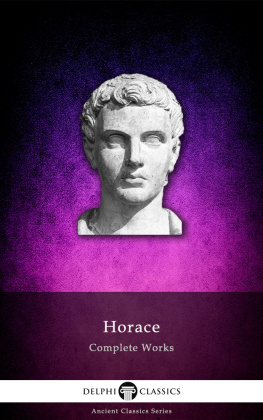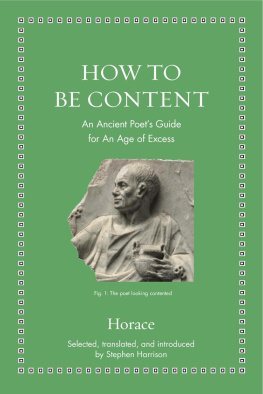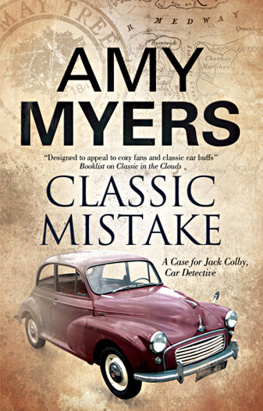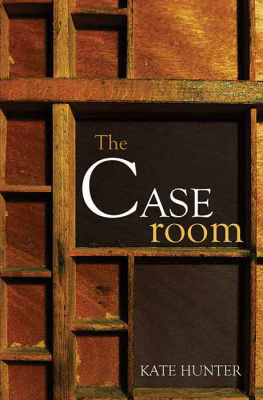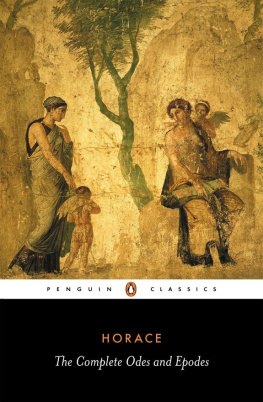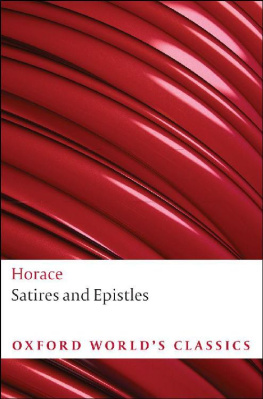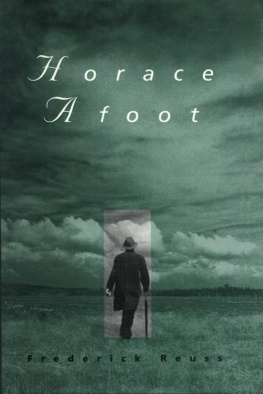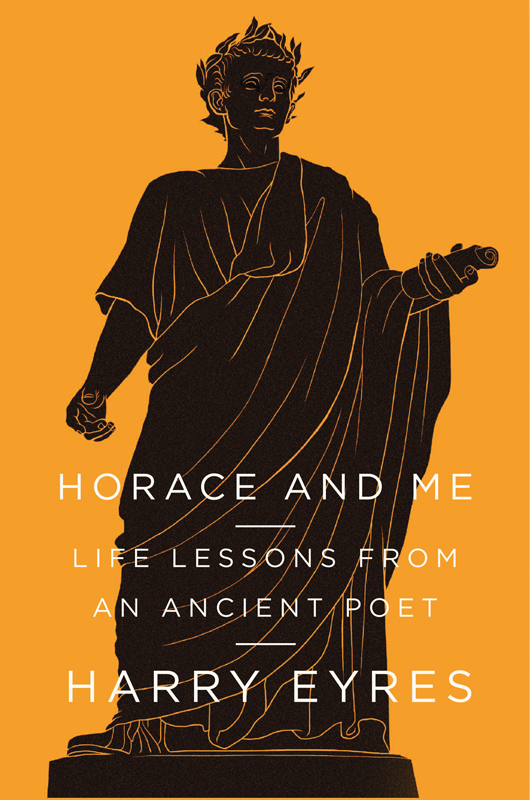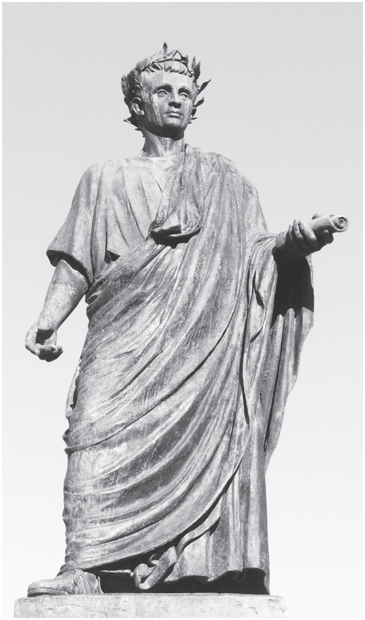

The author and publisher have provided this e-book to you for your personal use only. You may not make this e-book publicly available in any way. Copyright infringement is against the law. If you believe the copy of this e-book you are reading infringes on the authors copyright, please notify the publisher at: us.macmillanusa.com/piracy.
To my father, who lived and tasted the day to the very end
THE SACRIFICE (ODES 3.13)
O holy spring, Bandusia, clear one
Brighter than any man-made crystal
Let me sprinkle sweet wine over your waters,
And a bouquet of wildflowers.
Tomorrow Ill sacrifice a kid to you
A youngling, horns budding, all ready
For love and war, a bundle
Of life and lust, but doomed:
His warm red blood will stain your
Pristine, icy water, which demands
Nothing less than an entire life
Of one cut off from the flock.
In recompense you give all this:
Your lovely saving coolness which
No heat or war can touch,
Which the exhausted and the lost can drink.
And I will sing you into immortality
Speaking of the holm-oak growing
From your hollow rocks, the endless
Babble where your waters leap.
Contents
A Note on the Translations
All the translations from Horace, and all but one of the Catullus translations, are by me. The verse translations from Horace and Catullus are, strictly speaking, versions, rather than literal translations. My aim has been, in Ezra Pounds terms, to make the poems new. The first rule is that the versions have to live, to hold the reader, as contemporary poems, not museum pieces. The second rule is that they should keep as much of Horaces sense, imagery, tone, and music as possible, or as much as the first rule allows. I havent tried to reproduce Horaces wonderful intricate original meters with any exactitude because that does not seem to be compatible with the first rule. One obvious sticking point is mythologyin particular the glancing references to mythological stories and figures that Horace assumed his audience would know. There is no simple solution to that, but I have cut out certain references that seemed too obscure to make any sense without tedious elaboration. I have also, at times, replaced classical references with modern ones; in Odes 3.21, for instance, I have substituted Supermac (Harold Macmillan) for Consul Manlius, so that Horaces wine jar, vintaged in the year of his birth, becomes my own contemporary and twin. In Odes 3.29, I have brought in references to the war in Iraq instead of uprisings on the borders of the Roman Empire. Again there is Ezra Pounds precedent for this: the reference in Homage to Sextus Propertius, his collage of Propertius fragments, to a frigidaire patent. In all this I have been guided not by any consistent doctrine or theory but by rules of thumb based on an instinct for what makes a piece of writing feel alive rather than dead. I hope I have Horaces authority for that.
One
More Durable than Bronze
Once again Im taking this small object through airport security and Im wondering whether any of the machines will pick it up. Probably not. Though the contents are described as more durable than bronze and in terms of half-life rival any radioactive isotope, they dont set off any contemporary alarms. Our systems are geared toward mobile phones and computers, shoe bombs and booby-trapped undergarments. My object is made of metaphorical metal and its power and capacity cannot be measured in volts or gigabytes.
This thing is red in color and measures a little over six inches by four inches by one inch. It is in fact a bookan old Loeb Library edition that contains a hundred and twenty poems written two thousand years ago by the Roman poet Horace. One hundred and three of those poems are arranged in four books of odes (Horace actually used the word carmina , meaning songs), the work of which the poet was proudest, and which he thought would guarantee his immortality.
Placing this small battered book on my airport caf table, looking out over tarmac-covered runways, some woods beyond them, a gray English morning sky, makes me feel more moored and anchored in a place whose very essence is hypermobility. Moored to what? To myself, to some depth of feeling in myself.
Reading this particular poem, the thirtieth and last of Book Three, in which Horace prophesies that his odes will outlast the pyramids, is affecting me so much that I am afraid I may start weeping, or generally betray the kind of emotion you are not supposed to show in airport cafs.
Horace is making a pretty outrageous claim. He is saying that these poems are time-proofproof against floods and hurricanes, or just the drip-drip of steady rain and the passing of the uncounted days, weeks, months, the unnumbered series of years and the flight of time. The extraordinary thing is that he was right; he wrote his poems into the future, for the future as much as for the present, and they remain always contemporary. The scholars who try to nail Horace, and other ancient authors who still speak to us, down to the past have got something fundamentally wrong.
Not all of me will die; part of me will escape the goddess of death. Maybe thats whats affecting me. Something to counter the fear of death that attends all airports, all flights into the unknown. Im only flying to Turin (as it happens), but this is the place of departures and sometime soon theyll call my flight; my number will come. The mobile phone rings; its my partner wishing me a safe flight, reminding me to drink enough water. Shes right; I need water. But not water alone; I also need Horace, who said no poetry worth reading was written by drinkers of water. Just for a moment I weigh the sleek metal coolness of the phone against the warmer, frayed old book. In terms of apparent power, attractiveness, usefulness, surely the gleaming gizmo wins out (not that its a new phone, or a smartphoneany self-respecting teenager would regard it as an antique). I wonder which will have the longer future.
I am reminded of a phrase from a newspaper article I recently added to my cuttings file in which the historian Timothy Garton Ash criticized the thoughtless stereotyping of Poles as anti-Semitic. He went on to characterize the language of todays party politics as consisting of prefabricated phrases and glib half-truths. Such phrases and half-truths cannot be expected to last long. They are not made of the right durable stuff, for a start. Their foundations are not deep. They dont bear any profound relation to reality, or true emotion. When a big storm or disaster strikes, they fall apart, smashed to useless tinder.
Wandering into the airport bookshop, I notice the volume by the British Liberal Democrat minister Vince Cable entitled The Storm . The cover shows Cable looking suitably gloomy and also prophetic, against a backdrop of ominous clouds. His book is about the economic storm that hit the western economies apparently without much warning in 2008. For a few days or weeks in September and October of that year, following the collapse of the American bank Lehman Brothers, it looked as if the entire system of credit that lubricated the globalized capitalist system was seizing up.
I happened to be having lunch with a very important personage on one of those October days, when the U.K.s Royal Bank of Scotland, the worlds largest bank at that time, very nearly went bust. That would have meant money not coming out of ATM machines, people unable to pay for food, riots on the streets. My friend, a director of the bank, gamely went ahead with the lunch, during which we talked about the English Hispanist Gerald Brenan and our shared love of Spanish culture, but I could see he had turned pale and that he was hardly touching his food. If someone like him was worried, I reflected, we really must be in trouble.


